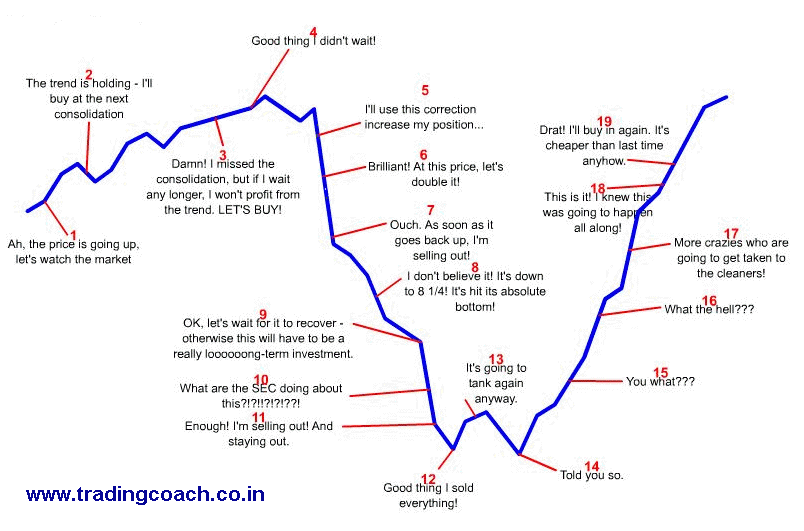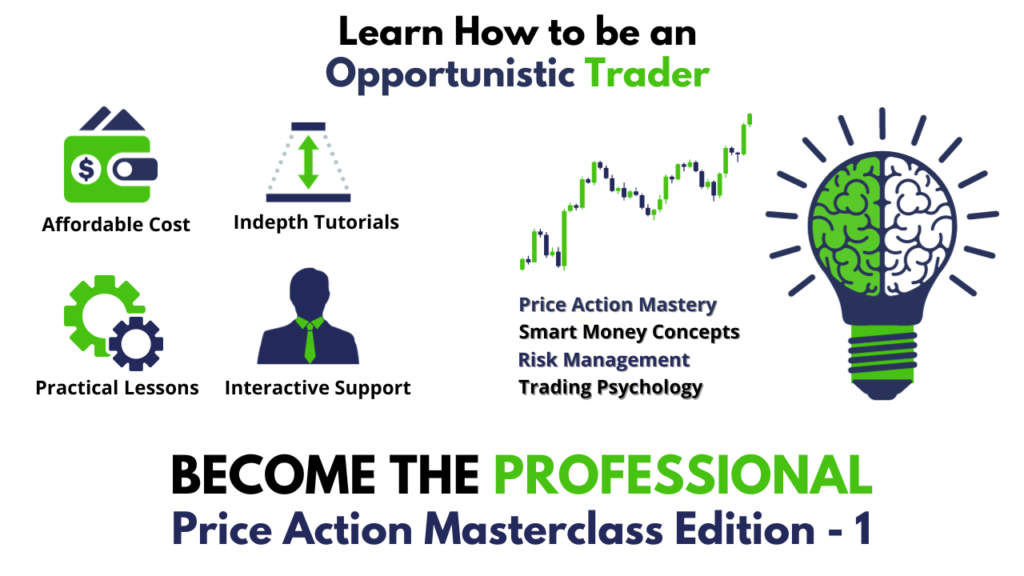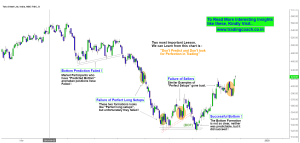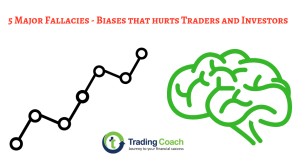The concept of efficient market hypothesis stands on the assumption that traders are rational and trade markets to maximize their profits and minimize their losses. But in reality, traders are blended mixer of rationality and emotions just like any other human beings, even the algorithms designed by traders or Institutions itself is biased because of the programming done by a quantitative trader.
As a human being, we won’t be able suppress our emotions completely but we can see how it influences our trading ideas and prospects and change the way we respond to those emotions. There is a framework of market psychology which affects every trader and Investor (both institutional and Retail traders) in a cyclical manner as traders progress or stumble and these set of emotions influence our decision making in the markets. If we can understand these cyclical emotions, then we can change our response to the psychological ups and downs.
10 stages of emotions traders experience:
1.Hopefulness: It’s a positive attitude or emotion which makes a trader hold onto a losing trade due to irrational hope of prices moving back in the expected direction. Even when a trader’s common sense says it’s not possible. It’s a common mistake done by novice traders.
2.Optimism: When initial ideas, analysis and strategies about the market work for a while, many novice traders start thinking about success and neglect the risk management. Overconfidence takes an upper hand in the trading process; sometimes as a result they take high risks and do over trading.
3.False Belief: This is a stage where a trader is surprised with his success and grows egoistic, thinks about himself being so perfect and smart due to initial success. A Stage which seduces us to develop false beliefs and expectations. Even experienced traders fall into the trap of false beliefs.
4.Euphoria: The strongest positive emotion a trader feels after seeing profitable short term results. It makes us think that making money in market is so easy and we forget the risk factor altogether. Over trading, taking high risks feels like no longer an issue! It’s an emotional peak for intermediate traders.
5.Nervousness: At this stage, traders start becoming a little nervous when some of their trades move against their expectations and beliefs. Few unrealized consistent losses, which we never expected make us a bit worried. Sometimes the losing proposition will be big due to improper risk management.
6.Refutation: After a period of losing streak, many traders start denying first and then acknowledging the fact, their actions might be wrong. False beliefs and expectations get challenged in this stage. Some traders will start blaming markets or brokers for their mistakes. Many will start jumping from one strategy to another in this stage.
7.Terror: Negative thinking and negative thoughts take over a trader’s mind completely. A broken trader might start thinking like “nothing will work for me”. Due to lack of confidence in their abilities, it’s pretty easier to fall prey for tips providers and advisories. If a trader couldn’t cope up in this stage, it may affect his personal life and relationships.
8.Distraction: This is the stage when a trader is completely blank about what to do and he starts taking positions unconsciously just to reach the breakeven point. Tries different techniques and approaches only to recover his lost money! His previous losses start impacting his present performance. A trader’s mind is completely distracted without proper objectives or clarity.
9.Horrified: When no ideas work, Indicator based approaches fail to yield any results, Tips and advices fail to give any positive outcomes, many traders engage in blind trading or revenge trading – leading to further losses. A trader is completely horrified in this stage and left in the middle of nowhere.
10.Hopelessness: Having no hope left, many traders will exit the market and never want to trade again. This stage is exactly opposite of Hopefulness and often experienced by Intermediate level traders. Trader feels absolutely hopeless about his decision-making abilities and gets disinterested in taking any further trades.
Many Traders are prone to these emotions and psychological mistakes. Self awareness is the key to improvement. Some traders need good guidance and assistance from other professional trader to get rid of their emotional mistakes, such traders must choose a proper mentor. Having a mentor can also reduce your learning curve and helps us avoid making big mistakes.
If we can understand the market psychology, our emotional factors affecting our decision-making abilities and then we can change our response to them, by doing it,We can really perform better in the markets. If we can have a grasp on our emotion we can manage our trading well.





